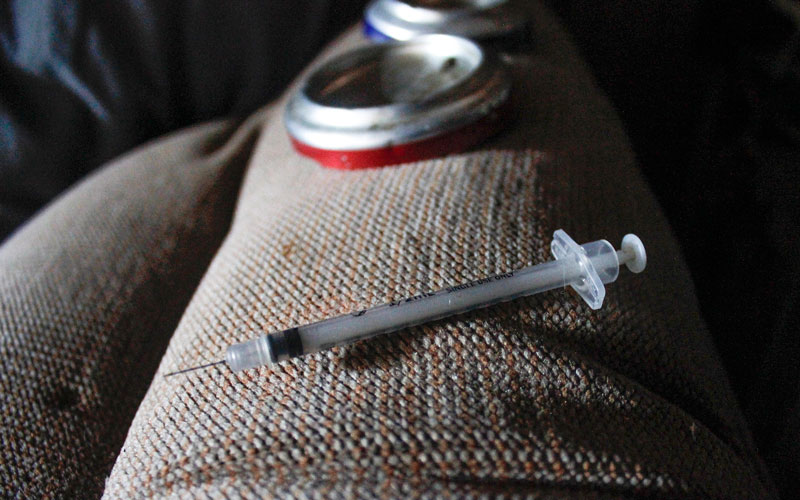
The Addiction Advocacy Day breakfast at the Arizona State Capitol Rose Garden, set up by Angie Geren, founder of Addiction Haven, served as a platform for advocates of addiction education to share information and push for change. (Photo by Danielle Grobmeier/Cronkite News)
“Wherever somebody’s at in their stage of drug use, their life is valuable.”
Those were the words of Haley Coles, director of Sonoran Prevention Works, who gathered at the state capitol Wednesday with others whose lives have been affected by addiction to put a human face on drug use and the fight against it.
Attendees passionately shared stories of personal battles and efforts to be of assistance in a loved one’s battle with addiction. The Addiction Advocacy Day breakfast at the Arizona State Capitol Rose Garden, set up by Angie Geren, founder of Addiction Haven, served as a platform for advocates of addiction education to share information and push for change.
“My goal for Wednesday is to show the legislators that addiction is really important in our community, and that there are ways that we can help at a legislative level,” Geren said. “To not only work to prevent, but how we can deal with the kind of crisis that we’re in right now.”
Dealing with addiction is, “in one word, frustrating,” said Dave Cooke, father to a 28-year-old man suffering from a heroin addiction. Cooke, founder of the nonprofit organization 100Pedals, said the first way to deal with addiction is to understand an individual’s situation instead of rushing to judgment.
“The best thing that our society can do is to better understand what happens when people make choices like that and how we can help them get healthy,” Cooke said.
Melissa Sue Tucker, creator of Addiction Support Podcast, lost one brother to a methamphetamine addiction and has another brother in jail stemming from actions related to a heroin addiction. She said helping an addict can be as simple as being empathetic.
“I think what’s most effective is just remembering that they’re people. They’re people that have a disease,” she said.
Focusing on the fact that addiction is a disease, a medical condition requiring treatment, the attendees voiced support of Geren in the fight to get Naloxone into the hands of those who need it most.
Naloxone is a medication that blocks the effects of opiates and reverses opiate overdoses. Enactment of House Bill 2355 would allow pharmacies to distribute the medication without a prescription.
“So many times people overdose in front of their friends and family members,” said Coles.
House Bill 2355 would give these family members and friends the ability to revive someone until they can receive proper medical attention.
“It literally saves lives,” said Mike Roberts, founder of the mobile resource center Austin’s Journey whose son died of a drug overdose.
Those against the use of Naloxone, say the medication gives users the idea that there’s a pass for bad behavior, said Geren.
“The primary arguments against it are if we provide Naloxone access, that this gives those suffering from addiction a free pass to use as much as they want and to be revived from it,” Geren said. “Some people think that it will increase drug use, that there will be no reason for them to get help because they can use and be revived.”
But, Coles said the experience of receiving Naloxone is painful, unpleasant and not something that would make a user want to use again.
“Ultimately, people can’t recover if they’re dead. It gives people another chance at living and getting into recovery,” Coles added.
House Bill 2355 has passed the House and is awaiting approval of the Senate.
Despite the intense struggles of addiction, Roberts said sufferers and loved ones should not lose hope.
“Frankly, recovery is really possible,” said Roberts.